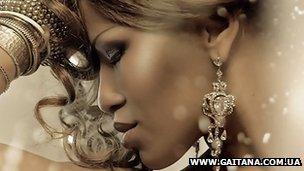Ukraine's Eurovision entry Gaitana 'ashamed' by racism
- Published

Gaitana is thought to have a good chance of making the final of the Eurovision Song Contest
For an event meant to celebrate kitsch entertainment, the Eurovision Song Contest retains an almost unrivalled ability to cause controversy.
That is certainly the case in Ukraine this year, where the run-up to the event has been marred by a row over racism.
The right-wing Freedom Party attacked the ground-breaking selection of a Gaitana - who is half Congolese - to represent Ukraine.
"Millions of people who will be watching will see that Ukraine is represented by a person who does not belong to our race," said Yuri Syrotyuk, whose party is preparing to contest the parliamentary elections later this year.
"The vision of Ukraine as a country located somewhere in remote Africa will take root," he added.
Condemnation
He later denied accusations of racism and said that he was criticising the "lack of transparency in the national selection".
But his comments were widely condemned in Ukraine by all the mainstream political parties, and celebrities including the boxers Vitaly and Volodymyr Klitschko, and the winner of 2004's Eurovision, Ruslana.
Gaitana, who will compete in the second Eurovision semi-final on Thursday night, said that the racist statement uncovered a "wide-scale" problem in Ukraine.
"I'm so ashamed of this unpleasant incident, because Ukraine is a democratic country, where kind and hospitable people live", she says.
'Two cultures'
Gaitana's Congolese father studied in the Ukrainian capital, Kiev, where he met and married her mother.
Shortly after her birth in 1979 the family moved to Congo-Brazzaville where they lived for five years. However the parents split up, and Gaitana's mother returned with her daughter to Ukraine.
While she was a child her father introduced her to the music of Diana Ross, Stevie Wonder, Michael Jackson, Lionel Richie and others.
She writes most of her own songs, which can be described as mixture of pop, soul and jazz.
She sees herself as a product of the fusion of two cultures - and she says that her friends in Congo find her music very African.
"At the same time," she says, "my Ukrainian grandmother thought of them as Ukrainian tunes. Two cultures have crossed inside me. I can write music which can be equally understood by Africans and Ukrainians."
The final of the contest is being held in Baku, in Azerbaijan, on Saturday, and 125 million people are expected to watch across Europe.
Music journalists gathering in Baku believe that she has a good chance of reaching the finals.
But she faces strong competition from Sweden, Turkey, Romania, Italy and Greece.
And her main rivals could be a Russian band - Grannies from Buranovo - most of whom are over 70.